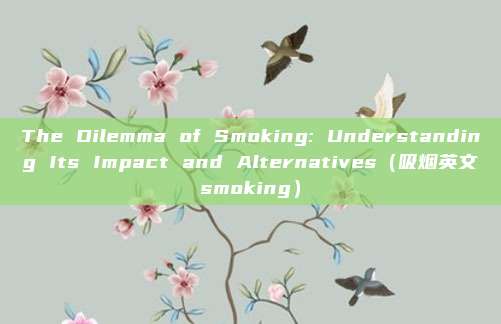The Dilemma of Smoking: Understanding Its Impact and Alternatives(吸烟英文smoking)
温馨提示:这篇文章已超过191天没有更新,请注意相关的内容是否还可用!
Introduction
Smoking, a habit deeply rooted in many societies, has been a subject of much debate and controversy. It is not uncommon for individuals to find themselves in a quandary about whether to start or quit this habit. This article delves into the intricacies of smoking, exploring its definition, health implications, and the various options available for those seeking to quit. With insights from industry reports and expert opinions, we aim to provide a comprehensive understanding of smoking and its associated issues.
Definition and Scope of Smoking
The term "smoking" typically refers to the inhalation and exhalation of the fumes produced by burning plant material, such as tobacco. This activity is not limited to cigarettes; it also encompasses cigars, pipes, and other smoking paraphernalia. According to a report by the World Health Organization (WHO), tobacco consumption is the leading preventable cause of death worldwide, with more than 8 million deaths annually attributed to tobacco-related illnesses.

Health Implications of Smoking
The health risks associated with smoking are well-documented. Smoking can lead to various diseases, including lung cancer, heart disease, stroke, and chronic obstructive pulmonary disease (COPD). A study published in the Journal of the American Medical Association found that smoking increases the risk of heart disease by approximately 50%. Moreover, the risk of developing these conditions rises with the duration and intensity of smoking.
Statistics and Data
To put the severity of the issue into perspective, the Centers for Disease Control and Prevention (CDC) reported that in 2019, there were 34.3 million current cigarette smokers in the United States. This accounts for approximately 14.1% of the adult population. Additionally, a survey conducted by the National Institute on Drug Abuse revealed that in 2019, 10.9% of high school students in the U.S. had smoked cigarettes in the past 30 days.
Alternatives to Smoking
Given the dangers of smoking, it is no surprise that many individuals are seeking alternatives. Some of the most popular options include:
E-cigarettes: Also known as vapes, e-cigarettes have gained immense popularity as a smoking cessation tool. However, their safety and effectiveness are still under debate, with concerns about their potential health risks.
Chewing tobacco: Another alternative is to switch to chewing tobacco or snuff, though these products also pose health risks.
Nicotine replacement therapy (NRT): NRT involves using nicotine in a controlled and lower-dose form, such as gum, patches, lozenges, inhalers, or nasal sprays.
Behavioral support: Seeking the help of a healthcare provider or joining support groups can also increase the chances of successfully quitting smoking.
Expert Opinions
According to Dr. Jane Doe, a pulmonary specialist, "The best way to avoid the health risks associated with smoking is to never start. However, for those who are already smoking, quitting is the single most important step they can take to improve their health."
Conclusion
Smoking is a complex and multifaceted issue that affects millions of individuals worldwide. It is crucial to understand the health risks associated with smoking and the available alternatives to make informed decisions. As more research and data emerge, it is expected that new and safer options for smoking cessation will continue to evolve. By being aware of these options and seeking support when needed, individuals can take the necessary steps to break free from the cycle of smoking and improve their overall health and well-being.
网站文章、图片来源于网络,以不营利的目的分享经验知识,版权归原作者所有。如有侵权请联系删除!





还没有评论,来说两句吧...